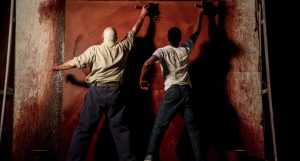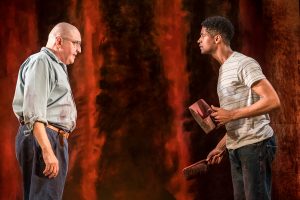Avengers star Hayley Atwell is forceful co-star with Tom Burke
[usr=5]
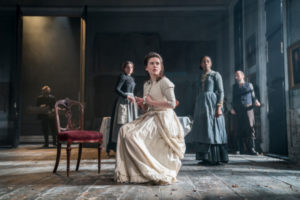
Rosmersholm is about wanting to pursue passion and change but being held back by the past – the political system, religion, inhertitance.
At the beginning, everything is covered in dustsheets in this stately home- Rosmersholm. The walls show signs of flood damage at the lower levels. It’s murky. Until Hayley Atwell playing Rebecca West starts pulling the sheets off and letting the light in.
It’s a year since Rosmer’s wife committed suicide in the lake and clogged up the millwheel, thus causing a flood.
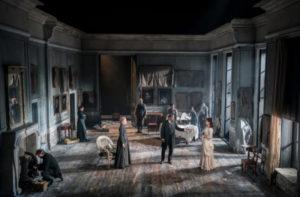
Her death raised questions, the main one being why did she do it? Rosmer is weighed down by his past. Not only the recent tragic event of his wife’s death but his whole inheritance. The high walls of Rae Smith’s brilliant set are covered in paintings of his ancestors staring down. He is expected to keep the line going.
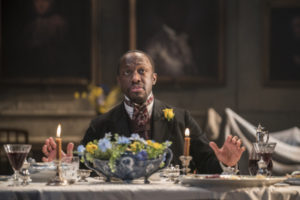
We are on the eve of an election and people are looking for a lead from Rosmer. But his disillusionment with the political system, where everyone is in it for themselves is profound. He renounces his traditional party- the conservatives, whose representative is superbly conveyed by Giles Terera as the likeable but ruthless Kroll who views women and the working class with contempt. So it seems Rosmer should back the radicals but both sides take against him. Both own newspapers that lie about him. You see there are many modern parallels.
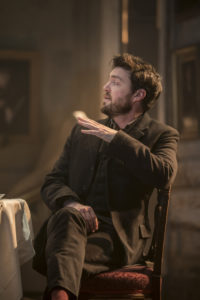
Mildly spoken Tom Burke as Rosmer pefectly conveys the uncertainty that alternates with his passion for Rebecca.
Good as Mr Burke is, the evening belongs to Hayley Atwell as Rebecca. She is the force of change and she is a force on the stage. Her performance is bravura but always believable. However even Rebecca is dragged down by the past.
This is an excellent cast. Lucy Briers is the housekeeper, representing the dour working class, still mired in superstition and believing what she reads in the papers. Jake Fairbrother is the radical newspaper editor, previously driven out of the town by holier-than-thou outrage, led by Rosmer, who is now the victim of the same high mindedness himself. Peter Wight is the faded leftwing revolutionary who is violently rejected by the workers he wishes to empower.
Nothing in Ibsen is straightforward and, as in his earlier An Enemy Of The People and The Wild Duck, naively believing that all you need is truth is a sure recipe for disaster.
Ultimately the politics gives way to the personal. Hope and heartbreak mark the love between John Rosmer and Rebecca West and, as this is Ibsen, a happy ending never seems on the cards. There are many questions and no easy answers in this masterpiece but there is much to thrill to as emotions once constrained begin to burst free.
Ibsen is famous for his revolutionary realism and Ian Rickson’s production and Duncan MacMillan’s adaptation triumph in making the characters in this 130 year old play seem totally real.
Also realistic are the set design by Rae Smith and lighting by Neil Austin which emphasise the claustrophobic setting and changing moods. Rae Smith‘s final contribution (which I won’t reveal), as the curtain metaphorically is about to come down, is a coup de théâtre that underlines what has happened and gives final proof of how much the design is another actor in this terrific production.
Finally a quick word of praise for producer Sonia Friedman. Again she has brought a play to the West End that might have been expected to stay in the domain of subsidised venues and, although she has used star names from film and TV, the stars are stage actors of the highest calibre. Commercial producers often look for safe, audience pleasers but Ms Friedman stretches and challenges her audience and, on this occasion, has rewarded them with an evening of extraordinary theatre.
Click here to watch the review on YouTube
SPOILER ALERT! This is a complaint about the publicity material. Rosmersholm is one of Ibsen’s least produced plays (although this may change after this powerful production), so audiences are unlikely to know how it ends. However, having seen the picture on the posters and adverts, they are likely to have a good idea as the play progresses.
